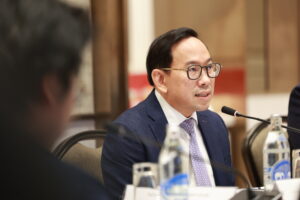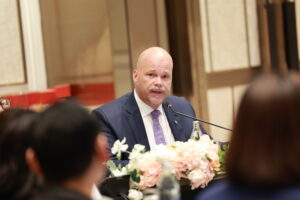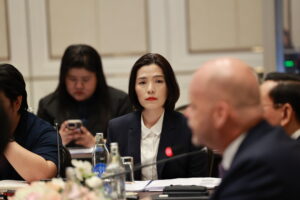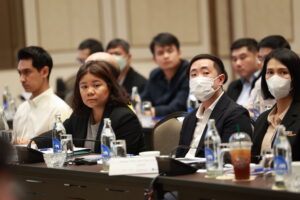Bangkok, Thailand, May 3, 2024 – The Global Green Growth Institute (GGGI) Thailand, in collaboration with the Department of Alternative Energy Development and Efficiency (DEDE), convened the first Project Steering Committee (PSC) meeting on May 3, 2024, for the Asia Low Carbon Building Transition (ALCBT) project. The event was attended by key stakeholders from Thailand in the building, energy efficiency and finance sectors, aiming to steer the course of this transformative five-year initiative.
The ALCBT project, funded by the International Climate Initiative (IKI) under the Federal Ministry of Economic Affairs and Climate Action (BMWK), targets substantial reductions in greenhouse gas emissions from the building sector across the five Asian countries; Cambodia, India, Indonesia, Thailand, and Vietnam. The project will deploy low-carbon building tools to assess greenhouse gas emissions in the building sector and the establishment of educational modules in collaboration with the consortium partners. Furthermore, during implementation the Energy Service Company (ESCO) model showcases the project’s practical impacts on energy savings and operational efficiencies in buildings.
It aims to develop and deploy low-carbon building tools for policy formulation and capacity building and addresses the urgent need for energy efficiency improvements in existing structures. The project strategy in Thailand encompasses technology application such as one-stop shop platform which including investors matchmaking function and low-carbon building assessment tools, the industry stakeholder capacity building to enhance skills and competences in relate to low-carbon buildings, financial pathways to facilitate ESCO model and on-bill financing, and replication and scaling frameworks to ensure the amount of GHG emission reduced directly and indirectly 1.68 TgCO eq in five countries.
Mr. Wattanapong Kurovat, Director General of the Department of Alternative Energy Development and Efficiency (DEDE), outlined the objectives of the project in his opening remarks. “This project aims to enhance tools and mechanisms for constructing low carbon buildings…collaboration from all stakeholders is paramount for achieving our goals,” Mr. Kurovat said.
“GGGI is the lead delivery, together with the consortium partners; HEAT International from Germany, ASEAN Centre for Energy (ACE) from Indonesia and Energy Efficiency Service Limited (EESL) from India. The building sector constitutes an estimated 40% of global electricity demand and 20% of emissions arising. It is a cross-cutting sector in nature which means retrofitting, improving, and maintaining the existing building and working on the innovations in construction materials such as green(er) cement manufacturing. This is also why the related departments and organizations across different sectors gather in the first project steering committee. Thailand has a new green building code; the alignment to this building code is important as well.” added Mr. Tero Tapio Raassina, GGGI’s Country Representative in Thailand highlighting the importance of cross-country learning.
Looking ahead, the ALCBT project aims to officially establish a Technical Advisory Committee in Thailand to carry out the technical contribution during the project implementation as well as further engage educational institutions and industry partners to expand its reach and impact.
About ALCBT
Asia Low-Carbon Buildings Transition Project (ALCBT) funded by the International Climate Initiative (IKI) under the Federal Ministry of Economic Affairs and Climate Action (BMWK), targets substantial reductions in greenhouse gas emissions from the building sector across the five Asian countries; Cambodia, India, Indonesia, Thailand, and Vietnam. The implementation period of the project is 5 years from 2023 to 2028. The project aims to develop and standardize low-carbon assessment tools and managing carbon emission from building sector, enhance capacity for key industry stakeholders to deliver low-carbon buildings in terms of energy efficiency and sustainable cooling, establish and facilitate financing mechanisms through energy service companies’ model to apply low-carbon building standard and green procurement and scale up and replicate the project tools and products at the national level as well as sharing knowledge and increasing awareness.
Photos by DEDE



